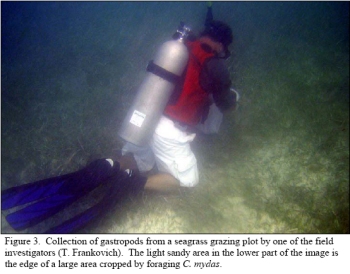Grant: 07-020R
Project Title: Blood Flukes, Major Pathogens of Sea Turtles: Life Cycle Studies in Coastal Florida
Project Manager: Dr. Ellis Greiner
Organization: University of Florida - College of Veterinary Medicine (Research and Educational Institute)
Grant Amount: $9,265.00
Completion Date: 2008-11-05
Summary: Spirorchiid trematodes or blood flukes are major pathogens of sea turtles and are associated with stranding and mortality worldwide. The diversity of spirorchiids documented in Florida sea turtles surpasses that of any other region. Despite the importance to sea turtle health, none of the life cycles are known for any marine spirorchiid species. Knowledge of parasite life cycles is essential to understanding the epidemiology of infections in the wild, including factors that may affect prevalence and disease in turtles. We will conduct life cycles studies in sea turtle habitat where conditions support transmission of spirorchiids. Gastropods will be screened for developing stages of spirorchiids using a sensitive and specific polymerase chain reaction (PCR) method developed and tested in previous studies. Efforts will target seagrass foraging grounds of loggerhead turtles and grazing plots of green turtles in Florida Bay and the greater Keys region. These studies are essential to the discovery of the parasite intermediate host(s), and thus the unknown life cycle(s), which are a major barrier to our understanding of this important infectious disease.  Results: This study was one of the largest efforts to discover the intermediate hosts of spirochiid trematodes and the first to investigate seagrass beds, an important sea turtle habitat, as a site of parasite transmission. Nearly 8,000 individual gastropods were examined for the presence of developing spirorchiids using a combination of molecular screening and gross examination of a subset of specimens. No evidence of spirorchiid infection was found, although fecal analyses performed on green turtles foraging in the study area indicated active infection and shedding of spirorchiid eggs by turtles. An ancillary benefit of the molecular technique used in this study was that other types of trematodes also were detected. Although no intermediate hosts of spirorchiid trematodes were identified, the intermediate host of a parasitic trematode of the digestive system of green turtles, and potentially a second alimentary parasite as well, were discovered. This breakthrough represents a significant advance in our understanding of sea turtle parasites because the life cycles of all sea turtle alimentary trematodes, like spirorchiids, previously were unknown and have implications on sea turtle health. . (Author: Dr. Ellis Greiner )
Results: This study was one of the largest efforts to discover the intermediate hosts of spirochiid trematodes and the first to investigate seagrass beds, an important sea turtle habitat, as a site of parasite transmission. Nearly 8,000 individual gastropods were examined for the presence of developing spirorchiids using a combination of molecular screening and gross examination of a subset of specimens. No evidence of spirorchiid infection was found, although fecal analyses performed on green turtles foraging in the study area indicated active infection and shedding of spirorchiid eggs by turtles. An ancillary benefit of the molecular technique used in this study was that other types of trematodes also were detected. Although no intermediate hosts of spirorchiid trematodes were identified, the intermediate host of a parasitic trematode of the digestive system of green turtles, and potentially a second alimentary parasite as well, were discovered. This breakthrough represents a significant advance in our understanding of sea turtle parasites because the life cycles of all sea turtle alimentary trematodes, like spirorchiids, previously were unknown and have implications on sea turtle health. . (Author: Dr. Ellis Greiner )